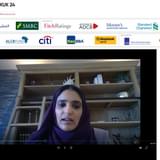In June Dana Gas announced that it was ceasing payments on 4-year sukuk that were set to mature in October this year, after the company had argued that these instruments were no longer “Shariah-compliant.”
Naturally, this did not sit well with not only with sukuk holders, but with experts and analyst who feared that this single case could undermine the entire Islamic finance industry and put its credibility in question.
For Shibeer Ahmed, a Partner at Winston & Strawn LLP, though this conflict “creates concern in the Islamic finance market, the issue raised by Dana Gas is specific to UAE law governed Mudarabah agreements, so there should be limited repercussion once the actual arguments being advanced by Dana Gas are made public - which may, in any event, be rejected by the court.”
A similar view is shared by Mohamed Rafe Mohamed Haneef, the CEO of CIMB Islamic, the biggest underwriter of sukuk deals worldwide. In an interview with Bloomberg, Rafe said that Dana Gas attempts to nullify its own sukuk were “bound to fail.” He went as far as to claim that the Dana Gas “case will leave the US$2tn global Islamic finance industry relatively unscathed”. According to him “we’re seeing an issuer facing a liquidity crunch trying to wriggle out using illegality or un-enforceability, which is a bit disheartening.”
“This case will likely be thrown out by the courts. I’m quite confident this case will be decided in favour of the sukuk holders,” Rafe said in the interview.
These sentiments are echoed by structured financed specialists, who are following the deal closely. One such commentator pointed out the company’s argument that “legal experts” declared the deal “illegal” is contentious, as only a court can make this ruling. They went on to speculate that the real drive behind this lawsuit is the “difficult” financial situation the company finds itself in, which could have perhaps been easier to resolve through a standard debt restructuring.
Either way, the main battle seems to be just beginning; creditors are less than thrilled with the company’s arguments and are not giving up without a fight. Just last week they went to UK High Court of Justice to try to overturn an injunction that prevents them from forcing repayment of the US$700mn sukuk.
Representatives of the sukuk holders accused Dana Gas of taking this controversial action as a way to avoid declaring themselves in default, as was the case during the company's previous sukuk refinancing, when Dana Gas had to agree to terms on its outstanding sukuk that the company now argues are too onerous.
This claim was of course refuted by the company’s CEO, Patrick Allman-Ward, during a broadcast phone call with investors where he cited “compliance issues” as the reasons for this unprecedented step.
“Compliance issues with regard to the current sukuk documents and instruments were identified by our legal advisers...as part of our due diligence ahead of sukuk restructuring discussions,” he said on Thursday.
UAE or London?
The jurisdiction in which dispute is going to be settled is another unclear point in this murky legal battle, mostly due to the way the sukuk is structured.
The current sukuk transaction documents are: “A Declaration of Trust, an Agency Agreement, a Purchase Undertaking, a Sale Undertaking, a Security Agreement, a Security Agency Agreement, Ordinary Certificates and Exchangeable Certificates for the Sukuk all of which are governed by English law and subject to the non-exclusive jurisdiction of the English Courts; and a Mudarabah Agreement, UAE Share Pledges and the UAE Mortgage which are all governed by the laws of the UAE and subject to the non-exclusive jurisdiction of the UAE Courts”, Ahmed explained.
According to the lawyer, Articles 693 to 709 of the Federal Law No. (1) 1987 Concerning Civil Transactions Law of the UAE (the Civil Code) deal with the UAE law requirements relating to Mudarabah.
“On the basis of publicly available information, I understand that Dana Gas is relying on the provisions of the Civil Code to argue that certain expectations, which the sukuk holders may have in relation to their rights under the Mudarabah Agreement, are not enforceable because they contravene the Civil Code. Dana Gas has obtained an injunction from the UAE Courts to prevent any enforcement action by the Trustee (acting for the Sukuk holders) until there is a full hearing”.
On the jurisdiction issue, Allman-Ward mentioned in the conference call that the English law in the sukuk documents “is part and parcel of the umbrella Mudarabah agreement,” implying that UAE law should prevail when determining the legality of the security.
Not everyone believes this to be the case: Bashar Al Natoor, Global Head of Islamic Finance for Fitch Ratings noted during a conference in London that “most of rated international sukuk issues are governed by English law in-addition to local laws.”
This is uncharted waters for both investors and issuers and there is only one previous similar case. In 2009, when Kuwait-based Investment Dar, was undergoing a debt restructuring, it argued a transaction with Beirut-based BLOM Bank SAL breached the religion’s Shariah principles because Dar “was taking deposits at interest.” However, the company’s case was quickly thrown out of a UK court, and its own Shariah Supervisory Board prohibited them from using arguments based on Islamic Law.
Significantly, the case of the Dana Gas sukuk stretches beyond the company itself; the truth is that Dana Gas might try to take advantage of one of the loopholes in the Islamic financing industry in the Arab world, where, unlike Malaysia, most countries have no centralised Shariah boards to approve deal structures. This is why investors are paying very close attention to this particular situation, as it might set a legal precedent for future sukuk defaults.
As Ahmed mentioned, there’s is a possibility of this sort of situation repeating in any other similarly structured sukuk which include a Mudarabah agreement governed by UAE law (or any other governing law which have provisions regulating Mudarabah contracts)”, which does nothing to reassured investors on the reliability of Islamic instruments.
Al Natoor, while pointing out that Fitch has not worked on Dana Gas’s case specifically, commented: “Parties usually have to agree in advance of the transaction which authorities will be assigned to make judgments on elements of the deal – whether it’s the legal side, Sharia compliance or other aspects.”
Whatever the outcome of the Dana Gas legal battle is, it is likely to set a major precedent for Islamic Finance, as it exposes the loopholes and risks still ingrained in this young and developing market.









